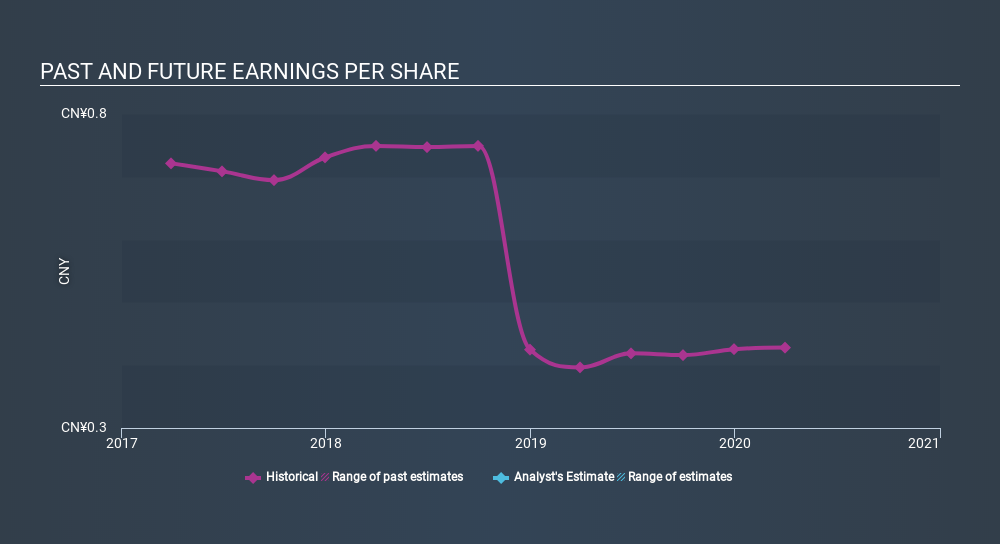Investors Who Bought Bank of Zhengzhou (HKG:6196) Shares Three Years Ago Are Now Down 53%

For many investors, the main point of stock picking is to generate higher returns than the overall market. But if you try your hand at stock picking, your risk returning less than the market. We regret to report that long term Bank of Zhengzhou Co., Ltd. (HKG:6196) shareholders have had that experience, with the share price dropping 53% in three years, versus a market decline of about 2.5%. And the ride hasn't got any smoother in recent times over the last year, with the price 32% lower in that time. Furthermore, it's down 15% in about a quarter. That's not much fun for holders.
See our latest analysis for Bank of Zhengzhou
While the efficient markets hypothesis continues to be taught by some, it has been proven that markets are over-reactive dynamic systems, and investors are not always rational. One imperfect but simple way to consider how the market perception of a company has shifted is to compare the change in the earnings per share (EPS) with the share price movement.
During the three years that the share price fell, Bank of Zhengzhou's earnings per share (EPS) dropped by 16% each year. This reduction in EPS is slower than the 22% annual reduction in the share price. So it seems the market was too confident about the business, in the past. This increased caution is also evident in the rather low P/E ratio, which is sitting at 3.92.
You can see below how EPS has changed over time (discover the exact values by clicking on the image).

It's probably worth noting that the CEO is paid less than the median at similar sized companies. It's always worth keeping an eye on CEO pay, but a more important question is whether the company will grow earnings throughout the years. Before buying or selling a stock, we always recommend a close examination of historic growth trends, available here..
What About Dividends?
As well as measuring the share price return, investors should also consider the total shareholder return (TSR). The TSR is a return calculation that accounts for the value of cash dividends (assuming that any dividend received was reinvested) and the calculated value of any discounted capital raisings and spin-offs. Arguably, the TSR gives a more comprehensive picture of the return generated by a stock. We note that for Bank of Zhengzhou the TSR over the last 3 years was -47%, which is better than the share price return mentioned above. And there's no prize for guessing that the dividend payments largely explain the divergence!
A Different Perspective
The last twelve months weren't great for Bank of Zhengzhou shares, which performed worse than the market, costing holders 28% , including dividends . The market shed around 2.8%, no doubt weighing on the stock price. The three-year loss of 19% per year isn't as bad as the last twelve months, suggesting that the company has not been able to convince the market it has solved its problems. We would be wary of buying into a company with unsolved problems, although some investors will buy into struggling stocks if they believe the price is sufficiently attractive. It's always interesting to track share price performance over the longer term. But to understand Bank of Zhengzhou better, we need to consider many other factors. Case in point: We've spotted 3 warning signs for Bank of Zhengzhou you should be aware of, and 2 of them are significant.
We will like Bank of Zhengzhou better if we see some big insider buys. While we wait, check out this free list of growing companies with considerable, recent, insider buying.
Please note, the market returns quoted in this article reflect the market weighted average returns of stocks that currently trade on HK exchanges.
Love or hate this article? Concerned about the content? Get in touch with us directly. Alternatively, email editorial-team@simplywallst.com.
This article by Simply Wall St is general in nature. It does not constitute a recommendation to buy or sell any stock, and does not take account of your objectives, or your financial situation. We aim to bring you long-term focused analysis driven by fundamental data. Note that our analysis may not factor in the latest price-sensitive company announcements or qualitative material. Simply Wall St has no position in any stocks mentioned. Thank you for reading.
About SEHK:6196
Bank of Zhengzhou
Provides various banking products and services in the People’s Republic of China.
Flawless balance sheet with proven track record.
Market Insights
Community Narratives


